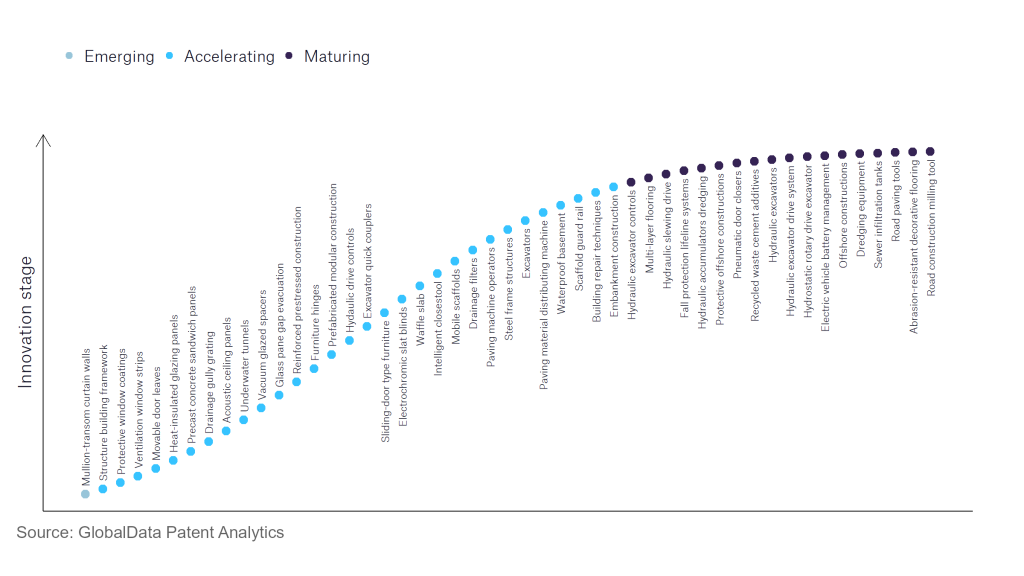The construction industry continues to be a hotbed of innovation, with activity driven by an increased focus on environmental sustainability, workplace safety and circular construction, and the growing importance of technologies such as robotics, the Internet of Things (IoT) and modular construction. In the last three years alone, there have been over 248,000 patents filed and granted in the construction industry, according to GlobalData’s report on Innovation in Construction: Multi-layer flooring. Buy the report here.
However, not all innovations are equal and nor do they follow a constant upward trend. Instead, their evolution takes the form of an S-shaped curve that reflects their typical lifecycle from early emergence to accelerating adoption, before finally stabilising and reaching maturity.
Identifying where a particular innovation is on this journey, especially those that are in the emerging and accelerating stages, is essential for understanding their current level of adoption and the likely future trajectory and impact they will have.
80+ innovations will shape the construction industry
According to GlobalData’s Technology Foresights, which plots the S-curve for the construction industry using innovation intensity models built on over 179,000 patents, there are 80+ innovation areas that will shape the future of the industry.
Within the emerging innovation stage, mullion-transom curtain walls are a disruptive technology that is in the early stages of application and should be tracked closely. Heat insulated glazing panels, drainage gully grating, and acoustic ceiling panels are some of the accelerating innovation areas, where adoption has been steadily increasing. Among maturing innovation areas are abrasion-resistant decorative flooring and road construction milling tool, which are now well established in the industry.
Innovation S-curve for the construction industry

Multi-layer flooring is a key innovation area in construction
Multi-layer flooring, or MLF, is any type of hard-surface flooring constructed through the bonding of multiple layers of distinct material, with the middle layer being a polymer-based material.
GlobalData’s analysis also uncovers the companies at the forefront of each innovation area and assesses the potential reach and impact of their patenting activity across different applications and geographies. According to GlobalData, there are 10+ companies, spanning technology vendors, established construction companies, and up-and-coming start-ups engaged in the development and application of multi-layer flooring.
Key players in multi-layer flooring – a disruptive innovation in the construction industry
‘Application diversity’ measures the number of different applications identified for each relevant patent and broadly splits companies into either ‘niche’ or ‘diversified’ innovators.
‘Geographic reach’ refers to the number of different countries each relevant patent is registered in and reflects the breadth of geographic application intended, ranging from ‘global’ to ‘local’.
Patent volumes related to multi-layer flooring
| Company | Total patents (2021 - 2023) | Premium intelligence on the world's largest companies |
| Valinge Innovation | 372 | Unlock Company Profile |
| Mohawk Industries | 362 | Unlock Company Profile |
| Berkshire Hathaway | 49 | Unlock Company Profile |
| Swiss Krono Holding | 32 | Unlock Company Profile |
| Akzenta Paneele + Profile | 32 | Unlock Company Profile |
| LG | 21 | Unlock Company Profile |
| 4Sight Innovation | 13 | Unlock Company Profile |
| Ceraloc Innovation Belgium | 13 | Unlock Company Profile |
| Ceraloc Innovation | 10 | Unlock Company Profile |
| Interglarion | 10 | Unlock Company Profile |
| Mannington Mills | 8 | Unlock Company Profile |
| Rockwool International | 7 | Unlock Company Profile |
| Tarkett | 5 | Unlock Company Profile |
Source: GlobalData Patent Analytics
Leading companies in the development of multi-layer flooring include Valinge Innovation, a designer and provider of flooring products. One of Valinge’s key innovations in the space include a floor panel, with a wear layer which has a higher wear resistance and a higher impact resistance than existing wood fibre-based floorings, as well as a more cost-effective production method. Other leading innovators in the development of multi-layer flooring include Mohawk Industries, a manufacturer and distributor of floor-covering products for residential and commercial applications. Mohawk Industries’ key patents in the space include a floor panel comprising a substrate and a top layer located above the substrate, wherein the substrate is single-layered and includes PVC material having a density of more than 650 kilograms per cubic metre. The floor panels can be applied to compose a floating floor covering, wherein the floor panels are connected to each other at their edges, however, lie freely on the underlying surface.
In terms of application diversity, leading companies in the development of multi-layer flooring include Rockwool International, a manufacturer and supplier of stone wool-based insulation products, and Mannington Mills, a manufacturer and distributor of flooring products. By means of geographical reach, leading innovators in the space include Berkshire Hathaway, Interglarion, and Mohawk Industries.
To further understand the key themes and technologies disrupting the construction industry, access GlobalData’s latest thematic research report on Construction.
Data Insights
From

The gold standard of business intelligence.
Blending expert knowledge with cutting-edge technology, GlobalData’s unrivalled proprietary data will enable you to decode what’s happening in your market. You can make better informed decisions and gain a future-proof advantage over your competitors.



